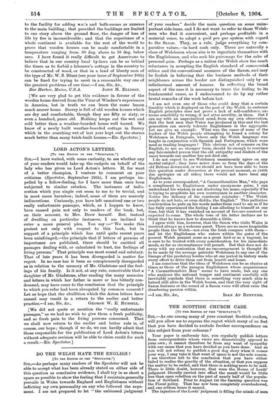[To THE EDITOR OF THE "SPECTATOR."] have waited, with some
curiosity, to see whether any of your readers would take up the cudgels on behalf of the lady who has given us Lord Acton's letters. If, for want of a better champion, I venture to comment on your criticism (Spectator, September 24th), I am perhaps im- pelled by a fellow-feeling, for I have more than once been subjected to similar rebukes. The instances of indis- cretion which you single out seem to me to be trivial, and in most cases harmless; indeed, some of them are scarcely indiscretions. Curiously, you have left unnoticed one or two really unfortunate passages, which, as I happen to know, have caused pain not only to readers of the book, but, on their account, to Mrs. Drew herself. But, instead of dwelling on particular instances, I am inclined to enter a more general plea. You say :—" We make this protest not only with respect to this book, but in support of a principle which has until quite recent years been uninfringed,—the principle that if letters of persons of importance are published, there should be omitted all passages dealing with, or calculated to hurt, the feelings of living persons." That principle was most sound and salutary. That of late years it has been disregarded is matter for regret. In no case has it been so conspicuously disregarded as in relation to the memory of Mr. Gladstone and the feel- ings of his family. Is it not, at any rate, conceivable that a daughter of Mr. Gladstone, after reading the many memoirs and letters in which her father is more or less bitterly con- demned, may have come to the conclusion that the principle to which you refer had been abrogated by common consent ? Let us hope that the ebullition which the Acton letters have caused may result in a return to the earlier and better practice.—I am, Sir, &c., GEORGE W. E. RUSSELL.
[We did not quote or mention the "really unfortunate passages," as we had no wish to give them a fresh publicity, and so fresh pain to the living persons concerned. That we shall now return to the earlier and better rule is, of course, our hope ; though if we do, we can hardly admit that those responsible for the publication of Lord Acton's letters without adequate revision will be able to claim credit for such a result.—En. Spectator.]










































 Previous page
Previous page